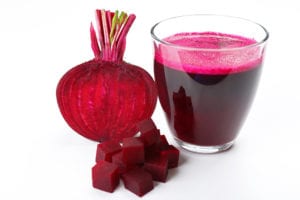Written by Jessica Patella, ND. Both raw beet juice and cooked beet juice significantly improved blood pressure, markers of inflammation and blood vessel dilation in participating subjects; however, only the raw beet juice improved cholesterol levels.
 An estimated 1 billion people worldwide suffer from hypertension, or high blood pressure 1. Hypertension, which causes about 9 million deaths per year, is known as the silent killer because many people do not know their blood pressure is elevated until it is very severe 2,3. It has been shown that a diet rich in fruits and vegetables can help lower blood pressure 2,4, but for the first time, beet juice has been shown to improve blood pressure 2.
An estimated 1 billion people worldwide suffer from hypertension, or high blood pressure 1. Hypertension, which causes about 9 million deaths per year, is known as the silent killer because many people do not know their blood pressure is elevated until it is very severe 2,3. It has been shown that a diet rich in fruits and vegetables can help lower blood pressure 2,4, but for the first time, beet juice has been shown to improve blood pressure 2.
The study included males and females from 25-68 years of age with elevated systolic (130-139 mmHg) or diastolic (85-89 mmHg) blood pressure 2. The participants were randomized to receive raw beetroot juice (250 ml/day; n=12) or cooked beet root juice (250 ml/day; n=12) for 2 weeks. This was followed by a 2-week washout period where nothing was given, followed by another 2 weeks taking the alternate juice2.
The raw beetroot juice was prepared by washing and juicing raw beets. The cooked beetroot juice was prepared by washing and cooking the beetroot on low in water, then consuming the beetroot juice and the leftover water from cooking 2.
Those in both the cooked and raw beet juice groups showed significant improvements in systolic and diastolic blood pressure along with multiple markers of inflammation and endothelial function (the ease of dilation in vessels) in the body. The results were as follows:
Before Raw Beet Juice After Raw Beet Juice Before Cooked Beet Juice After Cooked Beet Juice Significance
Systolic BP (mmHg) 133.96 +/- 9.44 127.29 +/- 8.47 134.58 +/- 11.03 129.17 +/- 10.59 P<0.001
Diastolic BP (mmHg) 82.71 +/- 7.22 78.12 +/- 4.85 83.33 +/- 7.47 79.79 +/- 6.67 P<0.001 and P<0.012 respectively
Hs-CRP (ng/ml) an inflammation marker 1.1 (CI 0.5-1.7) 0.7 (CI 0.4-1.2) 1.2 (CI 0.5-1.8) 1.4 (CI 0.4-1.6) P<0.005 and P<0.001 respectively
IL-6 (ng/ml)
an inflammation marker
2.2 (CI 2.0-2.4) 1.6 (CI 1.5- 2.9) 2.4 (CI 2.1-3.7) 2.3 (CI 0.6-2.3) P<0.001 and P<0.003 respectively
TNF-a (ng-ml) an inflammation marker 4.19 +/- 1.49 3.18 +/- 1.09 4.4 +/- 1.66 3.67 +/- 1.08 P<0.001
ICAM (ng/ml) a marker of vessel dilation 143.91 +/- 43.41 119.63 +/- 46.82 155.31 +/- 63.57 137.28 +/- 56.59 P<0.001
VCAM (ng/ml) a marker of vessel dilation 657.48 +/- 155.09 515.36 +/- 193.53 663.07 +/- 162.73 546.67 +/- 146.77 P<0.001
Only the raw beetroot juice improved cholesterol levels. The results were as follows:
Before Raw Beet Juice After Raw Beet Juice Significance
Total Cholesterol (mg/dl) 189.96 +/- 33.06 169.96 +/- 36.231 P<0.002
LDL Cholesterol (mg/dl) 117.67 +/- 24.35 103.08 +/- 25.11 P<0.001
Non-HDL Cholesterol (mg/dl) 141.95 +/- 31.19 122.79 +/- 34.95 P<0.003
This study was the first to compare the effects of raw beetroot juice and cooked beetroot juice on cardiovascular risk factors.
In conclusion, both raw and cooked beetroot juice showed significant improvement in blood pressure, decreased inflammation in the body and improved endothelial functioning (how the blood vessels dilate). This could possibly be due to the vasodilator, nitrate, in the beets, but further research measuring nitrate levels will need to be completed. Raw beetroot juice alone showed improvements in cholesterol levels, another risk factor for cardiovascular disease. The researchers recommended raw beetroot juice as an effective supplement for those who suffer from cardiovascular disease and also recommended another study with more participants.
Source: Asgary S, et al. Improvement of hypertension, endothelial function and systemic inflammation flowing short-term supplementation with red beet (Beta vulgaris L.) juice: a randomized crossover pilot study. Journal of Human Hypertension (2016) 30, 627-632.2,3
© 2016 Macmillan Publishers Limited
Posted December 29, 2016.
Jessica Patella, ND, is a naturopathic physician specializing in nutrition and homeopathic medicine and offers a holistic approach to health. She earned her ND from Southwest College of Naturopathic Medicine in Tempe, AZ, and is a member of the North Carolina Association of Naturopathic Physicians. Visit her website at www.awarenesswellness.com.
References:
- Asgary S, et al. Improvement of hypertension, endothelial function and systemic inflammation flowing short-term supplementation with red beet (Beta vulgaris L.) juice: a randomized crossover pilot study. Journal of Human Hypertension (2016) 30, 627-632.
- Lim ss, et al. A comparative risk assessment of burden of disease and injury attributable to 67 risk factors and risk factor clusters in 21 regions, 1990-2010; a systemic analysis for the Global Burden of Disease Study 2010. Lancet 2013; 380 (9859):2224-2260.
- Lasslet LJ, et al. The worldwide environment of cardiovascular disease: prevalence, diagnosis, therapy, and policy issues; a report from the American College of Cardiology. J Am Coll Cardiol 2012; 60 (25 Suppl):s1-S49.
- Appel JL, et al. A clinical trial of the effects of dietary patterns on blood pressure. N Engl J med 1997; 336 (16): 1117-1124.
